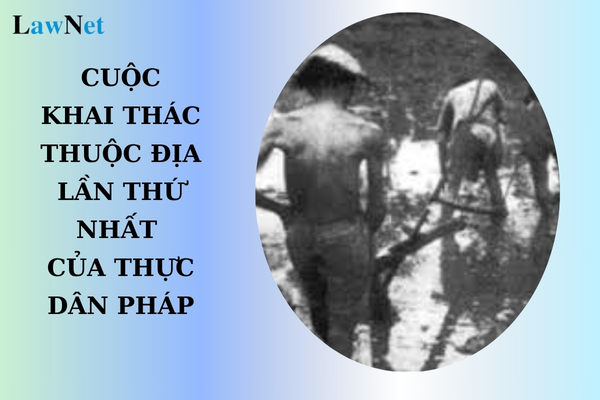What are the impacts of the first colonial exploitation by the French colonists on Vietnamese society? What are the characteristics of History and Geography at the lower secondary level?
What are the impacts of the first colonial exploitation by the French colonists on Vietnamese society?
The first colonial exploitation by the French colonists (1897–1914) had profound impacts on Vietnamese society in multiple respects, from economics and politics to social life, as follows:
1. Economic Impact
- Development of colonial economy: The French colonists focused on exploiting natural resources, especially coal, minerals, and rubber. The extractive industries and transportation infrastructure (such as railways and seaports) were constructed to serve the interests of the colonial power.
- Formation of a commodity economy: Vietnam's natural, self-sufficient economy was disrupted, and replaced by a commodity economy catering to export needs. Agriculture, especially rice, was oriented towards production for export to the French market.
- Exploitative investment: Although the infrastructure was improved, it primarily served resource exploitation and economic exploitation, bringing no benefits to the Vietnamese people.
2. Social Impact
- Division of old social classes: The landlord class, though losing its dominant status, grew in numbers. Some landlords became collaborators with the French colonists; the peasantry became increasingly impoverished, falling into poverty with no escape.
- Emergence of new social forces, such as:
+ Peasantry: numerous and heavily oppressed and exploited, ready to support and participate in the struggle for national independence.
+ Bourgeoisie: originated from contractors, factory owners, artisans, and merchants, suppressed and constrained, lacking revolutionary spirit.
+ Urban petite bourgeoisie: includes small-scale artisans, low-level public employees, and freelancers. These individuals, being educated and responsive to the times, were quickly enlightened and actively engaged in the early 20th-century national salvation movement.
+ Workers: originating from peasants, working in plantations, mines, and factories, lived in harsh conditions, and exhibited a strong fighting spirit against employers to improve their living conditions.
3. Political Impact
- Increased social discontent: French economic exploitation and political oppression escalated social conflicts. The worsening living conditions of the people led to discontent and uprisings against the French.
- Development of the patriotic movement:
+ New intellectuals, such as Phan Boi Chau and Phan Chau Trinh, emerged and initiated movements demanding independence and freedom.
+ These movements clearly reflected a transformation in awareness, from feudal resistance movements to new forms of struggle with more modern ideas.
4. Cultural Impact
- Western culture (lifestyle, education level, and thinking) was introduced into Vietnam.
- Many social evils and superstitions (such as drugs, prostitution, and superstition) still exist in society.
In summary, the first colonial exploitation by the French colonists deeply changed Vietnamese society, from the economy to culture and ideology. Although it contained elements of modernization, it primarily served the colonists' interests, leading to severe exploitation of the people. However, these impacts also sparked social conflicts and the consciousness of struggle, laying the foundation for subsequent patriotic movements.

What are the impacts of the first colonial exploitation by the French colonists on Vietnamese society? (Image from the Internet)
What are the characteristics of History and Geography at the lower secondary level in Vietnam?
Under Section I of the General Education Program for History and Geography at the lower secondary level issued with Circular 32/2018/TT-BGDDT, the characteristics of History and Geography at the lower secondary level in Vietnam are as follows:
- History and Geography at the lower secondary level play an important role in shaping and developing key qualities, general competencies, and scientific competencies in students, particularly historical and geographical competencies; they lay the foundation for students to continue studying in high school, vocational training, or participating in the workforce as productive citizens.
- History and Geography are compulsory subjects taught from grades 6 through 9. The subjects encompass the educational content of history, geography, and several interdisciplinary topics, simultaneously integrating and simplifying knowledge of economics, culture, science, religion, etc. Historical and geographical knowledge streams are interconnected to illuminate and support one another. Additionally, the subjects include several integrated topics, such as sovereignty protection, legitimate rights and interests of Vietnam in the East Sea; urban history and present; and the civilization of the Red and Mekong River deltas; major geographical explorations,...
What are the objectives of the History and Geography curricula at the lower secondary level in Vietnam?
Under Section III of the General Education Program for History and Geography at the lower secondary level issued with Circular 32/2018/TT-BGDDT, the objectives of the History and Geography curricula at the lower secondary level in Vietnam are as follows:
- The History and Geography at the lower secondary level contribute, along with other subjects and educational activities, to forming and developing essential qualities and general competencies in students.
- The subjects form and develop historical and geographic competencies in students based on a fundamental and selective knowledge base of world, national, and local history, geography; natural, socio-economic, and cultural processes occurring in space and time; and the interaction between human society and the natural environment.
- History and Geography at the lower secondary level help students learn to use the tools of historical science and geographical science to study and apply in practice; simultaneously contributing, along with other subjects and educational activities, to forming and developing essential qualities and general competencies in students, particularly the love for their homeland and country, pride in national traditions, respect for the diversity of world history and human culture, and inspires in students the desire to explore the surrounding world and apply learned knowledge to reality.

